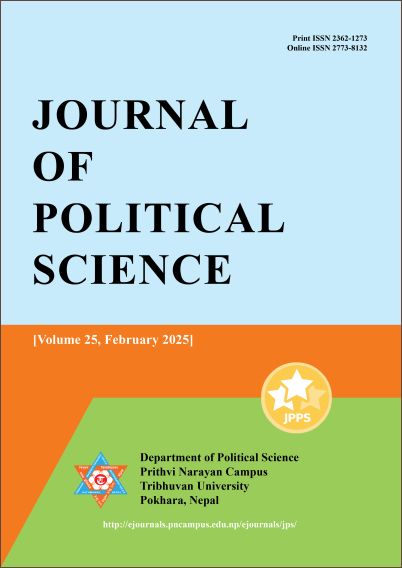Analyzing the Role of Key Stakeholders in the July Uprising 2024 in Bangladesh: Actors and Factors Approach
DOI:
https://doi.org/10.3126/jps.v25i1.75783Keywords:
Actors, the anti-discrimination student movement, Bangladesh 2.0, july uprising, the quota reform movementAbstract
This study examines July uprising 2024 is a significant event in Bangladesh’s democratic journey which ultimately led to the downfall of the 16-year-long Awami League regime. A contentious debate continues regarding the rightful ownership of the movement and the extent of various contributions. Central to this discourse is the identification of the key actors involved and an analysis of the factors or incidents that drove these individuals and groups to assume distinct roles within the uprising. This study explores the factors, actors and correlation among the actors involved in the July Uprising of 2024 in Bangladesh using a mixed-method, including literature reviews and convenience surveys (n=87). Utilizing stakeholder theory, it identifies 11 key actors i.e., Awami League Government, Anti-discrimination Students Movement (student protestors), Student League (student wing of Awami League), Youtuber/Blogger, General Public, Media, International Community or NGOs, Opposition Political Parties (BNP, Jamaat-e-Islami, etc.), Law and security enforcement agencies (RAB, Police, BGB, Bangladesh Army, etc.), Supreme Court and University Authorities. While the Anti-discrimination Students Movement and General Public have high power and interest, the Awami League Government and University Authorities show low interest despite significant power. Correlation analysis indicates a positive correlation between General Public and Student Protestors’ interest (r=0.44), a moderate correlation between Media and Awami League Governments’ power (r=0.25) and a negative correlation between Law Enforcement Agencies’ and Student Protestors’ power (r=-0.25). The paper concludes by emphasizing the need for inclusive governance and meaningful dialogue by the political parties to address systemic grievances and uphold democratic values.
Downloads
Downloads
Published
How to Cite
Issue
Section
License

This work is licensed under a Creative Commons Attribution-ShareAlike 4.0 International License.




